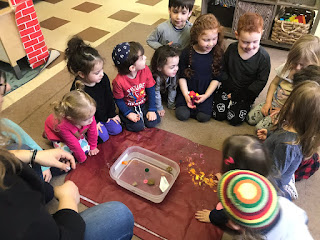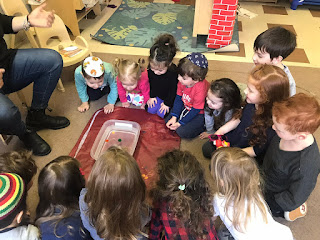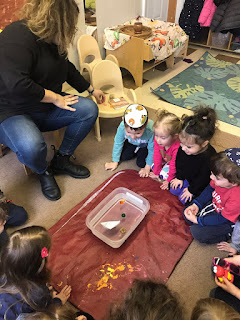Passover Unit- Nursery
What an exciting time it has been in our classroom, Passover has really brought out all of the creative abilities in your children. We used our imaginations to remake parts of the Passover story in our class plays. There has been overall joy and happiness into our room, as we rejoice the freedom of our people. In this unit we explore learning in depth about the story of Pesach, and different ways we can prepare for this time.
Passover story
Here is the Passover story as we learned in our class:
Here is the Passover story as we learned in our class:
4.1 Self-regulation
3.6 Listening to Others
4.5 Observing
4.6 Collecting and Organizing Information
4.1 Self-regulation
2.6 Positive Attitudes towards Learning
4.4 Questioning
4.7 Reflecting and Reaching Conclusions
Many years ago in a far away land called Egypt there lived
the mighty King Pharaoh.
One day he decided that he wanted tall big cities. He thought
to himself, “Who will build these cities?”
He called the Jewish people to come build for him.
Building these cities was hard work, but he didn't give them a
choice, he said that they had to build them!
The Jewish people were King Pharaoh's slaves.
The Jewish people were tired and hungry.
They asked the King if they could take a break to eat something.
King Pharaoh didn't give them time for relaxing meals or to rest.
Day after day the Jewish people had to work so hard without any rest. Their
hands and their backs hurt from carrying the heavy bricks.
They were sad and cried out to Hashem.
Hashem heard the cries of the Jewish people. He said, “I didn't create people to
be slaves! I created people to spend their time doing nice things for others and
to do mitzvos. But the Jewish people are slaves to King Pharaoh, they don’t
have time to do mitzvos and good things. I want to give the Jewish people the
Torah. From the Torah they will learn how to do good things and mitzvos. I must
free them to give them the Torah.”
Near Egypt there lived a man named Moshe, he was a shepherd. He took care
of his sheep by making sure they had food to eat and water to drink. But Moshe
was a special shepherd—he took extra care of his sheep. He watched them with
so much love. Hashem saw how Moshe took care of the sheep, and decided
that he will make a good and caring leader.
Hashem told Moshe, “I want you be the leader of the Jewish people. You will be
my messenger to King Pharaoh to tell him to free the Jewish people.”
Moshe was nervous to speak to King Pharaoh. He was scared about how King Pharaoh would react.
Hashem comforted Moshe and said, “I will be there with you, you will not see me, because I am
Hashem, but I will be there with you.”
Moshe went to the palace. On the way he saw the Jewish people working so hard, building the cities
while carrying heavy bricks on their backs. He thought to himself, “Even if I am scared to speak to the
King, I will be brave! Because that’s what a good leader does, I don't want to see the Jewish people so
sad.”
Moshe stood in front of the mighty King Pharaoh’s throne and said, “I am Rabbi Moshe, and I am Jew, I
have a message from Hashem.
Hashem says to let the Jewish people leave Egypt and not be slaves anymore.
King Pharaoh laughed at Moshe and said, “Ha ha ha, I will never let them go.“
Moshe did not give up, he asked King Pharaoh again, “Please let the Jewish people go!”
King Pharaoh answered, “I already told you! No, No, No, I will not them go!”
This happened 10 times! Rabbi Moshe begged King Pharaoh, but the king remained stubborn and kept
on saying NO!
Finally, King Pharaoh realized that he had to listen, and he said to Moshe, “Ok, the Jewish people can
leave Egypt and go live somewhere else.”
Moshe was so happy! The Jewish people will be free, they will not have to work so hard any more.
Moshe told the Jewish people the good news . “We are leaving Egypt and we will not have to be slaves
anymore, quickly, pack your possessions and get ready to leave!”
He told them to rush and get ready quickly. He said, “We don't want King Pharaoh to change his mind.”
Moshe said, “We will need to eat during our travels. But what food can we bake quickly? We will bake
matzah.” The Jewish people quickly poured flour and water into a bowl and kneaded. But instead of
putting the dough into the oven to bake, they made matzah circles and put them on their backs for the
hot sun to bake.
All the Jewish people gathered where Moshe told them to meet. They were so happy, they didn't stop
smiling. They were thrilled that they were going to be free and not have to work so hard anymore.
Making Pyramids
4.1 Self-regulation
4.8 Communicating Findings
3.12 Understanding of Orientation and Familiar Conventions of Print
3.6 Listening to Others
3.5 Using Descriptive Language to Explain, Explore and Extend
4.5 Observing
4.6 Collecting and Organizing Information
2.6 Positive Attitudes towards Learning
4.4 Questioning
4.7 Reflecting and Reaching Conclusions
4.18 Identifying Patterns
5.3 Fine Motor Skills
4.1 Self-regulation
4.8 Communicating Findings
3.12 Understanding of Orientation and Familiar Conventions of Print
3.6 Listening to Others
3.5 Using Descriptive Language to Explain, Explore and Extend
4.5 Observing
4.6 Collecting and Organizing Information
2.6 Positive Attitudes towards Learning
4.4 Questioning
4.7 Reflecting and Reaching Conclusions
4.18 Identifying Patterns
5.3 Fine Motor Skills
Songs of Passover
5.4 Auditory Skills and Music
“Oh listen, oh listen, oh listen King Pharaoh
Oh listen, Oh listen, please let my people go
They work so hard all day, they want to go away
King Pharaoh, King Pharaoh what do you say?
“No, No, No, I will not them go!”
What are the things we need for our seder table
These are the things we need for our seder table
We need a seder plate for our seder table
But the people around the table are what we need the most
What are the things we need for our seder table
These are the things we need for our seder table
We need a haggadah, we need a seder plate
But the people around the table are what we need the most
What are the things we need for our seder table
These are the things we need for our seder table
We need 4 cups of wine, we need a Haggadah, we need a seder plate
But the people around the table are what we need the most
What are the things we need for our seder table
These are the things we need for our seder table
We need 3 matzot, we need 4 cups of wine, we need a Haggadah, we need a seder plate
But the people around the table are what we need the most
Make a matzah pat, pat, pat
Do not make it fat, fat, fat
Make a matzah flat, flat, flat
In the oven just like that
Make charoset chop, chop, chop
Apples nuts and cinnamon
Add some wine that’s so divine
Make charoset chop, chop, chop
One morning when Pharaoh awoke in his bed
There were frogs on his pillow head and frogs on his head
Frogs on his nose and frogs on his toes
Frogs here, frogs there, frogs were jumping everywhere
Dig , Dig, Dig, Dig your shovels deep
Dig, Dig, Dig, there is no time to sleep
Because it’s work , work, work, every day and every night
Because its work , work, work, when its dark and when its light!”
4.1 Self-regulation
4.8 Communicating Findings
3.12 Understanding of Orientation and Familiar Conventions of Print
3.6 Listening to Others
3.5 Using Descriptive Language to Explain, Explore and Extend
4.5 Observing
4.6 Collecting and Organizing Information
2.6 Positive Attitudes towards Learning
4.4 Questioning
4.7 Reflecting and Reaching Conclusions
4.18 Identifying Patterns
5.3 Fine Motor Skills
Steps of the Haggadah
4.9 Reasoning Logically
4.5 Observing
4.6 Collecting and Organizing Information
4.1 Self-regulation
2.6 Positive Attitudes towards Learning
4.5 Observing
4.6 Collecting and Organizing Information
4.1 Self-regulation
2.6 Positive Attitudes towards Learning
4.3 Representation
4.4 Questioning
4.7 Reflecting and Reaching Conclusions
4.8 Communicating Findings
5.1 Increasing Levels of Activity, Endurance, and Variation in Types of Activity and Skills
Kadesh Reciting Kiddush
U’Rechatz Washing the hands
Karpas Eating a vegetable dipped in salt-water
Yachatz Breaking the middle matzah
Shulchan Orech Eating the festive meal
Tzafun Eating the afikoman
Beirach Thanking Hashem
Hallel Praising Hashem
Nirtzah Reciting Hallel
2.5 Regulating Attention, Emotions and Behaviour
4.4 Questioning
4.5 Observing
4.6 Collecting and Organizing Information
5.3 Fine Motor Skills
4.10 Classifying
4.9 Reasoning Logically
4.8 Communicating Findings
What floats and what sinks
2.5 Regulating Attention, Emotions and Behaviour
4.4 Questioning
4.5 Observing
4.6 Collecting and Organizing Information
5.3 Fine Motor Skills
4.10 Classifying
4.9 Reasoning Logically
4.8 Communicating Findings
4.7 Reflecting and Reaching Conclusions












Waiting for our turn
4.5 Observing
4.6 Collecting and Organizing Information
2.5 Regulating Attention, Emotions and Behaviour
Outdoor fun with the last snow fall of the year
5.2 Gross Motor Skills












































































































